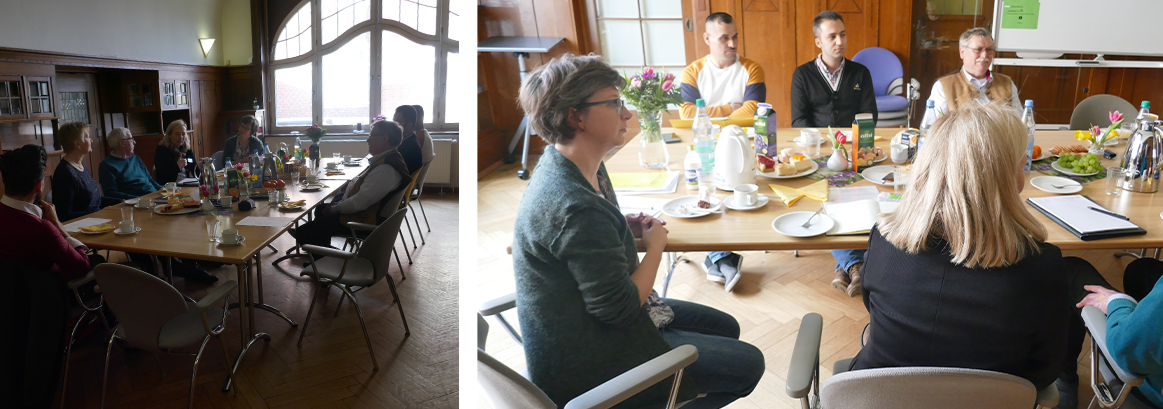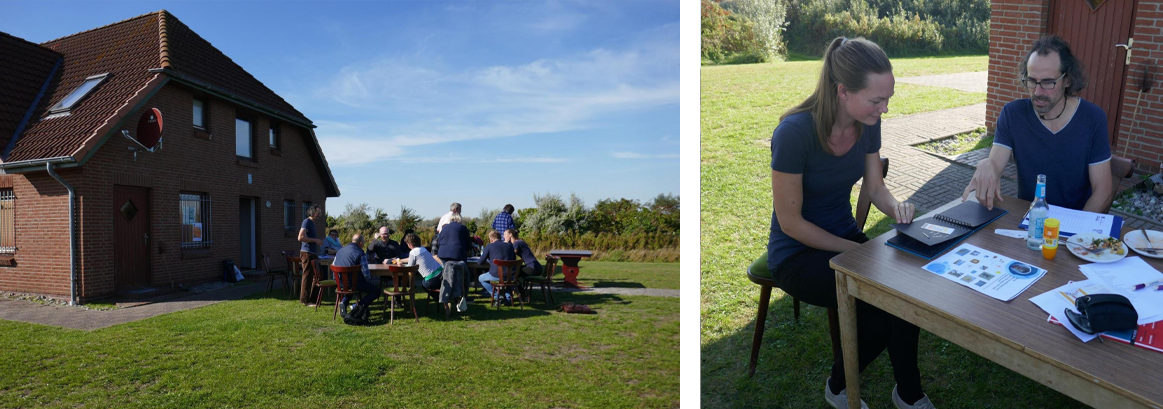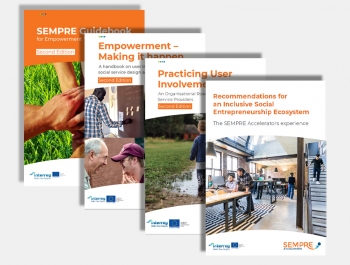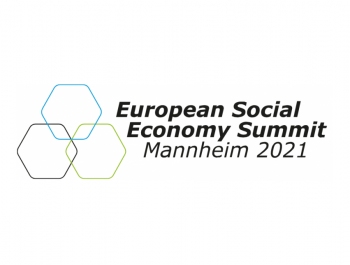Location: Nordfriesland, Germany
Vulnerable group in focus: Migrants and refugees
Coordination: Wirtschaftsakademie Schleswig-Holstein, Tina Zick
Do you speak German? Visit the local blog of Newspaper & Web and the Neu in Nordfriesland website.
|
Social Start-Up Biography On this page we want to document Newspaper & Web and its development into an independent social start-up. To take you with us on this journey, we update this interview diary every other month. If you have further questions, feel free to contact the local coordinator (see above). If you want to learn more about certain terms you may encounter here (such as "micro project", "social start-up", "Accelerator Team" and the like) please check our "the ideas behind the project" section. |
| Choose your issue of the Newspaper & Web biography: DEC 2019 FEB 2020 APR 2020 JUN 2020 AUG 2020 NOV 2020 JAN 2021 APR 2021 |
|
Tell us about your Micro Project in three sentences Our micro project operates at the nexus of journalism and social innovation and aims at supporting the integration of migrants and refugees with low to medium German language skills. We cooperate with a local magazine in which the members of our project publish articles about their cultural backgrounds, their life circumstances in the past (e.g. reasons for escaping from home countries, escape routes), their current situation, their hopes and their future plans. The project not only supports the integration of migrants into society, but also comes with an individual development perspective for the participants. Who are the persons behind the initiative? First and foremost, there are the migrants themselves who write the articles. They are supported by coaches experienced in journalism whom they meet every other week. The coaches guide and support "their" migrants in writing articles for press and internet blogs and in teaching German linguistic expressions. The third "player" in the game is a local magazine from the West Coast of Schleswig-Holstein which publishes the articles. What are your long-term goals? We are working on the development of this informal initiative which currently still relies on European funding into an independent, self-sustained organisation. We have not yet decided upon the exact (legal) form of this future organisation, yet this will be one of our main tasks. Therefore, the coaches and migrants of our initiative, supported by external mentors, will collaboratively work on topics such as financing, crowdfunding, potential organisational forms and the like.
Which topics do you currently address in your start-up? Recently, we invited a consultant specialised in the setup and development of small enterprises. Together with the expert we worked on our future perspective from an organisational point of view. One of our main aims is to formalize our currently still informal initiative; therefore we need to find a suitable legal organisational form. In the session we learned about different potential setups for our project and discussed the pro’s and con’s of each. Moreover, we discussed topics such as fundraising and crowdfunding as well as our needs and the available options in terms of our future location (i.e. our “business premises”). What are your challenges at the moment? We are all fairly busy and have many other obligations besides the project. Especially our migrant journalists spend much of their time with language classes, studies or their regular jobs. This is positive insofar as it shows that integration actually works. At the same time, however, it is also a challenge because we find it increasingly difficult to schedule our group meetings with all team members. What are your short-term goals for the next months? One of our short-term goals is to further work on the development of an organisational form. Out of the many options we are currently leaning towards the so-called interest group (“Interessengemeinschaft”, IG) which is a legal form that is relatively simple and seems to cater to our needs. Thus, for the next months our goal is to find someone who could give us further legal advice and to look for a good practice example from our region which could help us to understand all the implications by studying a “real” example.
Tell us about your recent achievements at Newspaper & Web! In March, just before the pandemic started to spread, we organised our “social start-up breakfast” in Husum. In SEMPRE Accelerators, all start-ups organise such events as a tool that allows the start-up members to present their achievements to a broader audience. At the same time, it is a possibility to establish informal contacts and explore networking which may turn out helpful in later stages of the start-up development. Below you can see pictures of the event. On a more strategic level, we made significant progress concerning the identification of a suitable legal organisational form. We invited a legal expert to provide further input on cooperatives and associations as two potential setups for Newspaper & Web. The expert also provided us with a checklist for the setup of an association (“eingetragener Verein” in German), which we discussed and worked through. However, we were not yet able to come to a final decision regarding the legal form as COVID-19 suddenly put almost all our activities on hold. Speaking of COVID-19, in how far does it influence the work in your Accelerator Team? What about the services offered by your social start-up during this situation? We moved our communication in the start-up and the Accelerator Team to video conferences. While this ensures basic communication, the core activities of our start-up – writing articles, learning journalism skills, developing our undertaking into a stable and sustainable organisation – are mostly paused until further notice. Some activities can be done online as well, but teaching and learning still work best in physical meetings. Moreover, our migrant journalists simply lack professional technical equipment to proceed remotely on a large scale.
Summer is at our doorsteps; and even though the situation with the pandemic is still difficult, we want to look ahead: What are you currently working on, what are your plans for the next months? While we are still forced to rely on online meetings and video conferences, we made some progress about our future organisational setup. Firstly, out of the different options, we decided to work towards the establishment of an association (“eingetragener Verein”). Secondly, supported by a legal expert, we developed a draft statute for the future association and discussed every single paragraph of these “club rules” in detail. These issues will remain at the centre of our attention for the next months. Moreover, we hope that we will be able to resume our actual business soon (i.e. writing articles and interviews as well as attendance lessons to improve all these skills). However, there is still a lot of uncertainty and it is difficult to make long-term plans under these circumstances. During our first interview half a year ago, you told us about your vision: an independent, self-sustained organisation. How far did you come on this path? Despite the current difficulties, we are well on track. With our plans for the establishment of an association we are approaching an essential milestone. At the same time, we still have certain challenges ahead, for example in the field of financing or concerning the number of active participants and supporters.
How did you progress over the past weeks? Our social start-up Newspaper & Web continued to work through online meetings. In June and July we focused in particular on crowdfunding. We explored different possibilities and received input from the state development bank about about a crowdfuning platform they operate. We identified this platform as one potential form of funding we could use.
In September you met the fellow social start-ups AllDi and Hear Me Out. Why did you meet and how was it? In bright sunshine, we met the social start-ups from Dithmarschen and Denmark for an informative exchange. Our gathering took place in Nordermeldorf, directly at the seashore. Each group prepared typical food from their region or home country, and together we enjoyed a colourful and delicious buffet in the garden of the community centre.
The event was a part of the SEMPRE Accelerators visit scheme. The purpose of this scheme is to create awareness for common challenges that the partners share, no matter whether they are located in Estonia, Sweden, Germany or elsewhere in the Baltic Sea Region. Through these events, the participating Accelerator Teams partners aim at initiating problem solving strategies in complex settings. Details about the event and further pictures can also be found in this news article.
It is December, and already one year passed since the very first interview. What were you working on in the meantime? We continued with our editorial meetings and the editorial work in our newspaper project. For instance, we prepared an article about a job shadowing that we did last autumn, and we also worked on a podcast. One of the podcast topics was recognition and its various aspects that are important for refugees: recognition of certificates, recognition of work experience, recognition of status, of people, of other cultures. Moreover, we started working on a crowdfunding campaign to sustain our small initiative financially. However, since October Germany is in a lockdown again and this makes it much more complicated to progress – be it in our daily editorial work or related to organisational questions. Tell us more about the crowdfunding! Where did you apply? How did it work? We are currently setting a profile at a regional crowdfunding platform (of IB.SH, the Schleswig Holstein Investment Bank). At the moment we are working on fine-tuning our profile there. We have to describe what our project is about, how we are going to implement it, and who is behind the project. We hope that the crowdfunding campaign will be successful, but therefore we have to compile a convincing profile on the platform first. How do you want to convince potential donors? Why should your project be supported? We believe that we have a convincing story to tell. What does it mean to have arrived in a city or a rural region, to feel good? Many refugees are concerned with this question, how they can integrate socially in their new home and find a job. We, a group of refugees from different countries of origin, write about topics that concern us: we write about differences between cultures, experiences from our old home and our new home, challenges in finding a job, or orientation in the new environment. Through our editorial work, we want to promote a mutual understanding between refugees and the regional population.
Welcome to our final wrap-up! After one and a half years of SEMPRE Accelerators support, your project now has to become independent. What were your main achievements? Firstly, our biggest achievement is that we contributed to mutual understanding in the region. Our aim is for refugees and locals to get to know each other and to exchange experiences in order to reduce misunderstandings and prejudices. Our main instrument through which we achieved this goal was our editorial work. Secondly, we are happy that we succeeded with our crowdfunding campaign. Thanks to the campaign, we can now purchase the necessary basic equipment to sustainably continue and implement our idea. And, thirdly, we worked on establishing a new, formalised association. What about this new, formalised association? Did you succeed? We worked on the statutory documents, for the association and worked on the formalities for a long time, but unfortunately we did not yet manage to conclude this process. Due to repeated lockdowns and due to the challenge that most members of Newspaper&Web have to balance their jobs with their duties here at Newspaper&Web, we didn’t succeed with this. However, we managed to develop a committed team that contributed to mutual understanding through its editorial efforts here in the region. |





